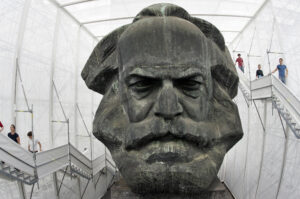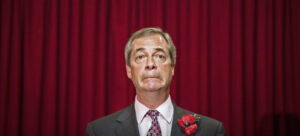Quietly, quietly, a revolution is taking place in Britain. Its forum is neither the streets nor the barricades, but committee meetings chaired by economists and overseen by politicians. The Bank of England, now in its 25th year of independence from the Government, is at risk of going broke — and it wants both a bailout from the taxpayer and the ability to raise taxes all of its own.
This is despite the fact that the Bank is at risk of going broke because of the very Quantitative Easing (QE) programme it pursued over the past decade. In other words, we are about to enable, with no public debate, the largest self-licking ice cream cone the country has ever seen.
In the event of the Bank going broke, a bailout would be underwritten by a letter sent by the then-Chancellor Alistair Darling to then-Bank of England governor Mervyn King in the heady days of 2009. This document enabled a so-called Asset Purchase Facility to help the Bank clean up the mess left over from the 2008 financial crisis. Yet since the letter can be read as open-ended, the current governor Andrew Bailey has said that it can be used again if the Bank goes broke.
Indeed, to some extent this technique is already being used: public borrowing figures suggest that £9.7 billion have been sent from the Treasury to the Bank. And the Bank is already short on funds to shore up its internal operations. While its current stance is that it will not ask the Treasury to backstop these losses, given recent history of mission creep in a crisis situation, this could change in a pinch.
This follows on from changes made by the Financial Services and Markets Act this year, which allow the Bank of England to raise a levy on private banks in Britain to fund its operations. In the cold light of day, however, the levy looks suspiciously like a tax and raises the question of whether the Bank of England is taking on quasi-governmental powers.
To better understand these developments, we must return to the chaos of March 2009. The global economy was reeling from the effects of the financial crisis and the recession that followed. Economists were terrified that we might be headed for a replay of the Great Depression, and so took on an attitude of “whatever it takes”. The Bank of England, like other central banks in the developed world, committed to a policy of Quantitative Easing (QE). This entailed creating enormous amounts of (electronic) money and flooding the banking system with it. Technically speaking, it meant buying eye-watering amounts of government debt from the private banks. Since the size of government debt and its interest rate are inversely related, interest rates went to the floor. The hope was that this would spur private-sector lending.
Did it work? Well, the old joke — that if you ask a roomful of economists a question, you’ll end up with a roomful of different answers — certainly applies here. There are still some defenders of QE who claim that it saved the economy. A more cynical reading would be that it simply juiced asset markets and generated enormous financial bubbles in everything from stocks to bonds to classic cars and Rolex watches. It is the unwinding of these bubbles that is making the Bank of England’s own financial situation precarious.
After all, having bought this debt, the Bank was saddled with it. So, when we saw an outburst of inflation in the past few months and the Bank moved to raise interest rates, it had to start flooding the market with this debt. The price of the debt duly fell, and the Bank realised that it was haemorrhaging losses on its debt portfolio.
The obvious question is: did the Bank not factor in this possibility when it engaged in the QE programme in the first place? My guess is that they did not. The rush to enact it was driven by fear and more than a touch of hysteria. Economists at the time really had convinced themselves that the developed economies would never see inflation again.
Of course, those in charge at the Bank would no doubt prefer that this is not discussed. They will claim that they did their best in bad circumstances. And this is no doubt true. But it does raise questions about the growing closeness between central banks and financial markets. When I worked in private asset management, a friend at one of the big investment banks joked with me that we were simply overpaid civil servants. He was alluding to the fact that capital allocation by private markets, which should be seeking out the most profitable ventures in the real economy, was increasingly becoming a Punch and Judy show — with investment managers playing the role of puppets and the central bankers pulling the strings.
The result of this dubious use of monetary policy is now bearing fruit: paradoxically handing the Bank of England more, not less power, further entwining the Bank with the markets. None of this will stuff the pockets of those in charge of the Bank, of course — but it will certainly be ploughed into hiring more economists and financial experts to come up with more “innovative ideas”, such as the QE programme that got us here in the first place.
All of which raises an obvious question: what is the Bank getting out of this? Now that it has quasi-taxation powers and the Government is filling the gap in its funding, what exactly is the money being spent on?
Back in 1998, when the Bank of England was made independent, there was broad consensus among economists on what central banks should do. By the Nineties, the basics of monetary policy management had been gleaned. This, the politicians and the public were assured, was a matter of science. The central bankers were simply carrying out objective exercises in economic modelling and using its interest rate setting policy to align the economy with its findings.
It makes for a nice story, but is it true? Probably not. The effects of monetary policy changes are far less predictable than central bankers make out, and the margin for error in economic forecasts is nothing short of legendary.
Even taking the story at face value is no longer plausible. This is because the Bank’s agenda has begun to creep. Consider its commitment to “net zero” in its corporate bond purchasing scheme, which includes updating the Bank’s “remit to confirm… the economic strategy of the Government”. What does this have to do with the monetary policy debates that led to the Bank’s independence in 1998? Absolutely nothing. It’s just economists playing politics.
Or take the Bank’s research into a Central Bank Digital Currency (CBDC) — the so-called “Britcoin”. Some view its proposal as a totalitarian imposition. Others see it as the future of finance. It doesn’t matter which side is correct; the very fact that people disagree is the key point. Britcoin does not even carry the pretence of being based on “scientific” or “objective” macroeconomic models. Rather, it is a case of a bunch of economists, hired by a central bank which is independent of the government yet receiving bailouts, getting enthusiastic about investigating an idea and funding themselves to do so.
Here we can see the perverse nature of its incentives. The Bank of England has spent years engaged in experimental monetary policies that have blown a hole in its finances — and now the Bank is asking the Government for a blank cheque to help it find a way to move beyond the monetary policy objectives that were the excuse for its independence in the first place. You need not be a hardcore libertarian to see these developments as dubious.
What is the solution? A debate, perhaps. Let’s have the leaders of the Bank drop the often-haughty pretence of gnostic knowledge and have a real discussion. Let them justify — in clear constitutional English, not the financial jargon they so enjoy — the policies that have led to their own bankruptcies. And let them also justify both the powers they are requesting and what they intend to do with them.
The men and women who are working at the Bank are no doubt well-meaning, diligent civil servants. But perhaps, being economists, it might be time to calculate whether the incentive structure at the Bank itself has become corrupted.
Disclaimer
Some of the posts we share are controversial and we do not necessarily agree with them in the whole extend. Sometimes we agree with the content or part of it but we do not agree with the narration or language. Nevertheless we find them somehow interesting, valuable and/or informative or we share them, because we strongly believe in freedom of speech, free press and journalism. We strongly encourage you to have a critical approach to all the content, do your own research and analysis to build your own opinion.
We would be glad to have your feedback.
Source: UnHerd Read the original article here: https://unherd.com/




